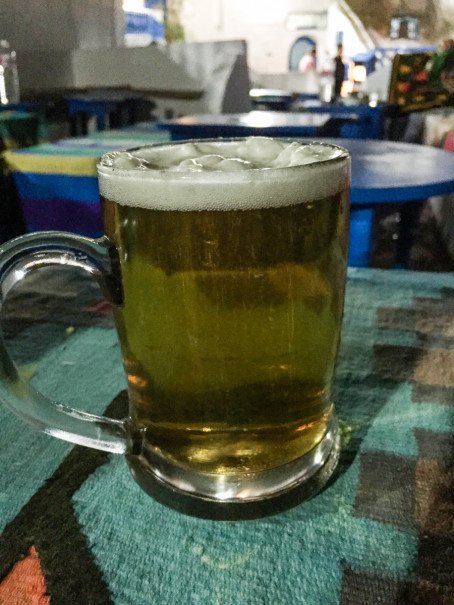
There Are Worse Things Than No Beer at All

There Are Worse Things Than No Beer at All
Non-Alcoholic Beer in Sidi Bou Saïd
Something is terribly, dreadfully wrong with our beer. We’ve all just clinked our glass mugs together and have taken a swig, and I can see a visible wave of disgust ripple across our group. The beer is sweet, sickeningly so, with a taste reminiscent of supermarket-brand lemon-lime soda with a draft of seltzer poured in for good measure. We look around for our waiter, who is nowhere to be seen.
It wasn’t hard to convince our group to go out for drinks tonight. We’ve been inside of a cramped tour bus almost since the moment we arrived in Tunisia to cover the government’s bi-annual olive oil competition. Our hosts have arranged for a solid week of continuous day trips and activities, both in the capital of Tunis and the surrounding countryside, which has left little room for random leisure. This may be intentional. The ISIS attack on the Bardo Museum was only a few weeks prior to our arrival, a fact that we are all acutely aware of, and which is punctuated by the discreet-but-armed security car that follows our tour bus whenever we leave the city.
Our hosts, watchful but not controlling, leave us to our own devices in the evenings, and after a few days we feel comfortable and rested enough to explore on our own. Not far outside of the city lies the French Colonial town of Sidi Bou Saïd, whose quaint seaside atmosphere and blue-and-white painted buildings convince us, perhaps naïvely, to visit after dark without our chaperones.
We picked our hillside café at random after wandering down a dark, sparsely trafficked lane. The tangle of cobbled streets and alleyways is lit sporadically by the diffused orange glow of sodium bulbs set in decades-old street lamps. The silhouettes of stray dogs can be seen all around us, and the air is filled with the scent of cigarettes, shisha pipes, and the ocean. At the café, we sit on stone benches covered in rugs and small pillows and look out at the spectacular, glittering coastline of the Gulf of Tunis. My companions are chatting with each other amiably but I’m not going to be able to relax until I figure out what the deal is with our drinks. Are we getting ripped off (it happens to the best of us) and does our waiter think we’re not going to notice? Or does he think that we’re simply not going to say anything? More importantly, what is in my mouth?
My companions can see that I’m upset and we debate what could have gone wrong, but no clear solution presents itself, and our waiter is now almost conspicuously absent. After a few pensive minutes someone says, “I think it’s non-alcoholic.”
Graffiti denouncing the deposed dictator Zine El Abadine Ben Ali is prominent in the capital, and at lunch, our Ministry hosts and tour guide speak seemingly without reservation about the rise of democracy and freedom of speech. We are told that where once no political parties existed, now there are between 50-100. The hijab, which reportedly saw a rise in visibility while the democratically-elected Islamic Ennahda party was in office, is virtually nowhere to be seen. Frankly, it’s not what I expected. After all, I’m out having a beer in a country where ISIS and religious jihadists are still trying to disrupt the nascent democracy that has been established. Some months after my trip, from safety of my apartment back in the U.S., I would learn that the Tunisian government declared a state of emergency after a young man with a machine gun opened fire on a peaceful resort beach in Sousse. The chaos in Libya, which lies directly east of Tunisia, continues to bleed across the border.
Returning to the hotel in a cab later that evening, an enormous, seemingly abandoned building across from the street from the armed security gates is revealed to actually be a nightclub named “Piranha Club Lounge.” Garish neon lights and pumping electronic music invade the peaceful, windy night sky. Next to me, a journalist from Brazil sees the sign, laughs, and explains to us that in Portuguese “piranha” is a colloquial term for prostitute. He wonders out loud if that kind of place even exists in Tunis, but I’d prefer for that to remain a mystery. I’m just a writer looking for a beer.
Thankfully, the hotel bar is still open.